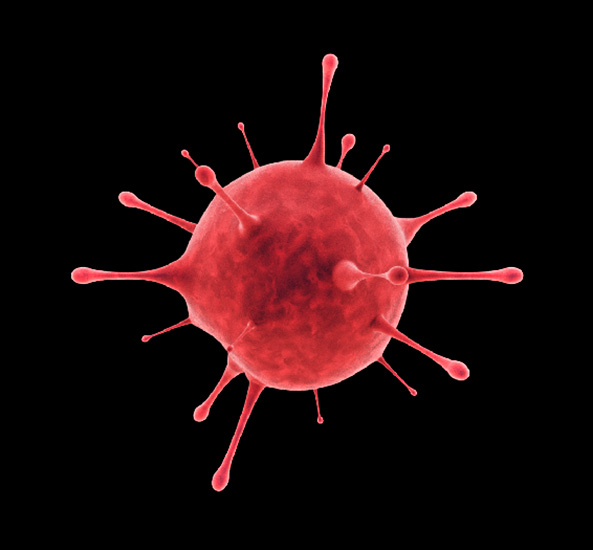|
created by wirestock SARS-CoV-2 replication alone
may not explain Covid-19. is that it targets multiple organ systems despite being one type of virus.
One answer to this oddity is that the coronavirus, SARS-CoV-2, exploits multiple receptors.
The recent discovery of neuropilin-1 and CD147 (basigin) receptors - in addition to the previously known ACE2 receptor - explains why SARS-CoV-2 can invade,
Another reason may be the virus's capacity to inflame the blood vessels and cause clotting.
In line with this, a new theory has cast light on how SARS-CoV-2 might disturb the vascular system.
New findings
In a study published last month in Vascular Pharmacology, Yuichiro J. Suzuki, a professor at the Department of Pharmacology and Physiology at Georgetown University, and co-workers discovered that the spike protein of SARS-CoV-2 is enough to trigger a response in lab-cultured human endothelial and smooth muscle cells from the lungs' blood vessels.
Yes, just the spike protein, without the whole virion or its genome...
The MEK/ERK pathway is responsible for initiating cell growth, which may explain the thickening of blood vessels' walls seen in autopsies of deceased patients from Covid-19.
This study also noticed that such vascular thickening did not happen during the autopsy of influenza cases.
Interestingly, looking back at published autopsy reports (in China and Canada) of SARS-1, the study authors also did not find evidence of vascular thickening.
So, this disease feature is unique to SARS-CoV-2 or Covid-19.
New hypothesis
In another paper by Prof. Suzuki published in Medical Hypotheses, he further discussed the study's implications, where he proposed a new hypothesis, "The Viral Protein Fragment Theory of COVID-19 Pathogenesis."
Prof. Suzuki hypothesized that, upon SARS-CoV-2 infection, some of its spike proteins might get released elsewhere.
As he stated:
If the theory is correct, then treatments stopping SARS-CoV-2 replication only will be ineffective...
Remdesivir is one prime example, where it only stops the viral enzyme needed for its replication.
Thus, a successful antiviral may need to halt both viral replication and released spike protein fragments.
It's a theory
Still, it's a theory or hypothesis that requires more research to verify.
Presently, the viral spike protein fragment theory of Covid-19 vascular complications is only supported by in vitro (cultured cells outside a living organism) work, which may or may not translate to animals or humans.
So, the next step might be to expose lab animals to SARS-CoV-2 spike proteins and see if vascular problems develop, and what might stop them.
But it's plausible that not all spike proteins on the SARS-CoV-2 surface are needed to bind to receptors on human cells.
The theory also concerns mRNA vaccines.
It's harmless as the virus can't replicate without its genome.
However, judging from the safety data of the mRNA vaccines clinical trials, we can be assured that the vaccine-induced spike protein production will not cause any major health issues.
Perhaps the spike proteins are being made in the right quantity to trigger useful immune responses, and not too much to affect the blood vessels.
Short abstract
A study offers new insights into what might cause blood vessel dysfunction in Covid-19.
The study found that the spike protein of SARS-CoV-2 is sufficient to induce growth signaling in blood vessels in the lungs. This is consistent with the blood vessel wall thickening observed in autopsies of Covid-19, and not in other respiratory viral diseases.
Thus, SARS-CoV-2 may attack the host via two ways:
If this theory is true, then drugs halting SARS-CoV-2 replication alone like remdesivir will not work.
|


